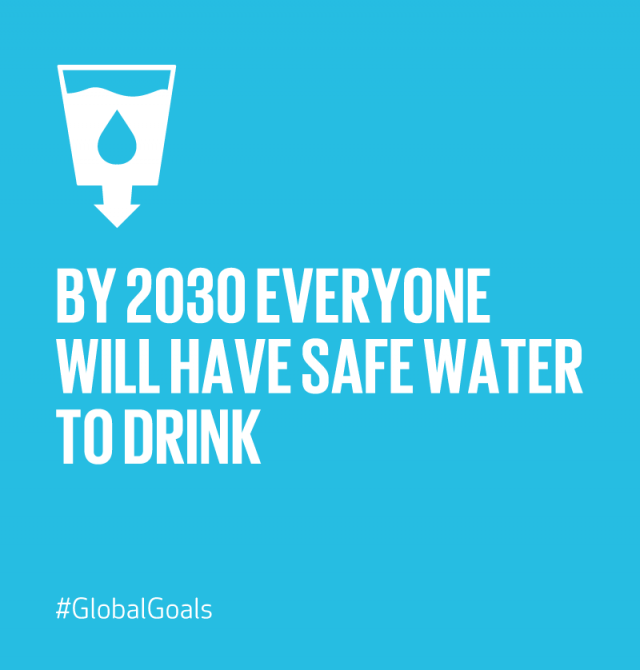6. Clean Water

Ensure access to water and sanitation for all
Why It Matters

Clean, accessible water for all is an essential part of the world we want to live in. There is sufficient fresh water on the planet to achieve this. But due to bad economics or poor infrastructure, every year millions of people, most of them children, die from diseases associated with inadequate water supply, sanitation and hygiene.
Water scarcity, poor water quality and inadequate sanitation negatively impact food security, livelihood choices and educational opportunities for poor families across the world. Drought afflicts some of the world’s poorest countries, worsening hunger and malnutrition.
By 2050, at least one in four people is likely to live in a country affected by chronic or recurring shortages of fresh water.
Facts & Figures

- 2.6 billion people have gained access to improved drinking water sources since 1990, but 663 million people are still without
- At least 1.8 billion people globally use a source of drinking water that is fecally contaminated
- Water scarcity affects more than 40 per cent of the global population and is projected to rise. Over 1.7 billion people are currently living in river basins where water use exceeds recharge
- 2.4 billion people lack access to basic sanitation services, such as toilets or latrines
- More than 80 per cent of wastewater resulting from human activities is discharged into rivers or sea without any pollution removal
- Each day, nearly 1,000 children die due to preventable water and sanitation-related diarrhoeal diseases
- Hydropower is the most important and widely-used renewable source of energy and as of 2011, represented 16 per cent of total electricity production worldwide
- Approximately 70 per cent of all water abstracted from rivers, lakes and aquifers is used for irrigation
Targets

• Ensure all have access to safe water.
• Ensure all have access to sanitation (safe sewage disposal and good waste management) and public education on healthy hygiene habits.
• Monitor water quality to reduce contamination. Prevent chemicals or contaminants from being thrown into the water.
• Improve water use, developing greater resources for it’s reutilisation.
• Raise awareness among communities to ensure they play an active part in improving their water management and sanitation.
• Protect and restore water-related ecosystems, including mountains, forests, wetlands, rivers, aquifers and lakes.
Take Action

- Don't waste water. Be more mindful about how you use it.
- Take short showers. Bathtubs require litres more water than a 5-10 minute shower.
- Don't rinse. If you use a dishwasher, stop rinsing your plates before you run the machine.
- Support organisations that empower communities to improve their own sanitation and hygiene.
- Work to invest in water research and development, and promote the inclusion of women, youth and indigenous communities in water resources governance.
- Generate awareness and action to increased sustainability and integrity
- for both human and ecological systems.